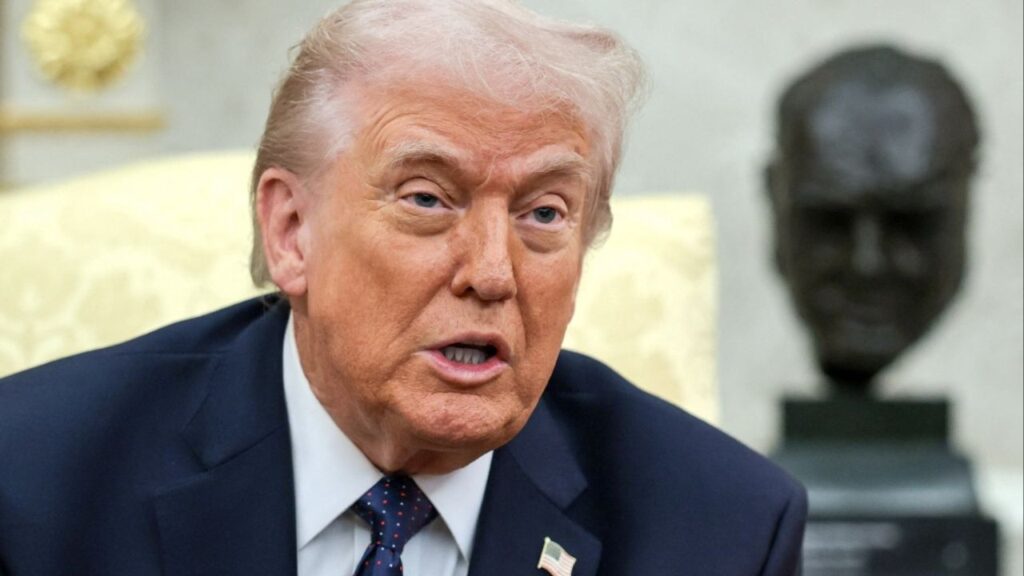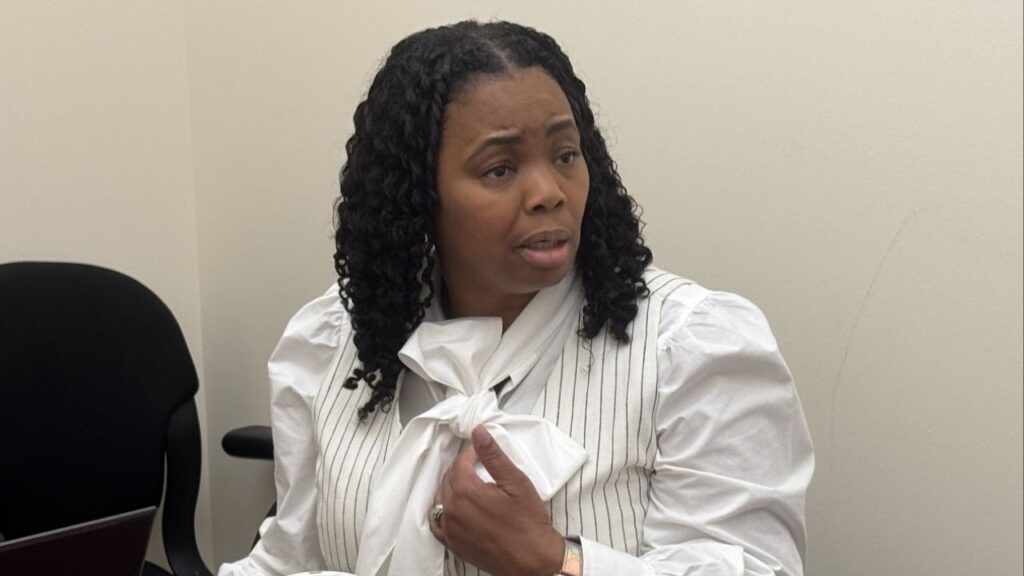Senate Majority Leader Chuck Schumer (D-N.Y.), chats with Vice President Kamala Harris after presenting her with a golden gavel, at the U.S. Capitol in Washington, Dec. 5, 2023. Harris forged important relationships in her four years as a senator, but cast some of her most significant votes while serving as vice president. (Al Drago/The New York Times)

- Kamala Harris' speech energized Democrats but left some undecided voters needing more specifics and substance for their support.
- Republicans like Craig Scott criticized Harris' speech for its patronizing tone and lack of concrete solutions.
- While Harris' speech inspired some, like Ryan Rivera, others, like Jason Shepherd, found her too liberal despite being moved.
Share
|
Getting your Trinity Audio player ready...
|
On Thursday night, it was up to Kamala Harris to make the closing argument for why Democrats deserved another four years in the White House. In her headlining speech of the Democratic National Convention, which had been as festive, and at times as frivolous, as a giant block party, Harris spoke of standing up to global tyranny, and of lessons she learned from her single mother. She blasted former President Donald Trump as an “unserious man” and spoke of the “awesome responsibility” that comes with the privilege of being an American.
It all left Democrats on the convention floor feeling euphoric and focused, confident that her speech would spur the Democratic base to turn out in November.
Related Story: The Great Convention Divide: How Voter Energy Will Tip the Scales in November
Outside of the Arena
But outside the arena, and outside the bubble of ride-or-die Democratic voters, some voters, particularly Republicans, said they did not even bother to watch the speech. And among some still on the fence — those who could make a difference in a tight contest — Harris’ words did not make immediate converts. They said they needed more specifics.
Bob and Sharon Reed watched Harris’ speech on their farm in the hills of central Pennsylvania. Both of them voted for Trump in past elections and both of them liked some of his policies, if not his personality. They came away from Harris’ speech feeling a little conflicted.
The problem? They liked it.
“I really wasn’t happy with the Biden administration,” said Sharon Reed, who like her husband is 77 and a retired schoolteacher. “But listening to her tonight, maybe it’s not as hard to vote for her. And, you know, I’m a little scared of what Trump will do when he gets back in power.”
Reed appreciated how Harris drew several specific contrasts between what she would do as president versus what Trump would do.
Bob Reed, who had been leaning toward Trump, found Harris’ optimism and can-do attitude appealing. “This sounded presidential,” he said.
It had all left them as undecided as ever, and hoping the debates might help them make up their minds.
“I want some concrete answers and some substance in those debates,” Sharon Reed said. “I don’t know if I’m going to get either.”
Related Story: How You Pronounce Kamala? Her Grandnieces Explain at the DNC
Words Against Biden’s Record
But others weighed Harris’ words against the record of the Biden administration. Craig Scott, a Republican, watched the speech Thursday while settled in a chair on his backyard patio in High Point, North Carolina, with a slice of pizza in hand.
Scott, who has written essays about how his incarceration experience as a Black man led him to support Trump, had been turned off by other parts of the convention, particularly the Democrats’ rhetoric on race and their portrayal of the election as a battle of good versus evil, all of which he found to be patronizing.
“Their whole messaging is always, ‘You need to vote for us because we’re the good white folks, and they’re the bad white folks,’” Scott said. “That has been their pitch for decades.”
He verbally appended Harris’ speech with a lively running commentary. When she mentioned how abortion rights had been shattered because of Trump, he shot back: “Well, Trump mentioned he supports exceptions.”
When she promised that she would ensure, as president, that the country would always have “the strongest, most lethal fighting force in the world,” he laughed.
“That’s going to be a hard one for her to sell,” he said, recalling America’s disastrous withdrawal from Afghanistan in 2021.
Others seemed to have made their minds up before the first balloons had been inflated, let alone dropped.
Hours before Harris’ history-making speech Thursday, Chelsea Howell Garcia, 33, said she would not bother watching it. Garcia, who lives in McAllen, Texas, and owns a trucking and logistics company, said she had been voting Republican in presidential elections since she was old enough to vote.
Related Story: Trump’s Reaction to DNC? He Calls Harris ‘a Lunatic’ and Walz ...
The Millennial Voting Bloc
She followed the Democratic convention primarily via Instagram and Facebook, and said she saw and heard nothing on social media that would change her feeling that the Biden administration, including Harris, had done little to improve economic conditions for people like her.
“Millennials my age cannot even afford a home right now,” she said. “Younger people, like my niece who just graduated from college, can’t even use their degrees to work. They can’t find a job.”
In Phoenix, Ryan Rivera, 20, had felt mostly disgust and dread at the prospect of a Biden/Trump rematch. But as Rivera, a trans man, sat in their bedroom and watched Harris speak, they said they felt glimmers of the thrill and hope they had seen from audiences who cheered early speeches from Barack Obama.
“This is the first acceptance that’s really made me emotional,” said Rivera, who works in a Target. “It’s changed a lot. I’m a lot more confident in voting for her.”
Some 1,800 miles east, in suburban Cobb County, Georgia, Jason Shepherd, the former chair of the county Republican Party, also went quiet and closely followed Harris’ description of her childhood. Shepherd, too, had been raised by a single mother. As he watched the speech in his living room, which was adorned with a bust of Ronald Reagan, he noted that like Harris, he had also worked at a McDonald’s as a young person. And he, too, had gone on to become a successful lawyer.
Related Story: The Great Convention Divide: How Voter Energy Will Tip the Scales in November
He admitted that parts of Harris’ speech had moved him. At one point, he said, “I like her better” than Trump.
But Shepherd, 48, who is also an associate professor of political science at Kennesaw State University, noted that he had been a conservative for decades. He flinched when Harris attacked Trump, contending that an acceptance speech was a time for a candidate to act presidential and seek unity. And like Scott, he said he could not overcome Harris’ record, which, he said, proved that she was too liberal to ever earn his vote.
Though he did not care for Trump’s personality, he said, he would vote for him again in November, just as he had in 2016 and 2020.
“We need someone like her to be president,” he said of Harris. “But it needs to be someone conservative.”
–
This article originally appeared in The New York Times.
By Richard Fausset, Campbell Robertson, J. David Goodman, Eduardo Medina and Isabelle Taft/Al Drago
c. 2024 The New York Times Company
RELATED TOPICS:
Categories

Reddit Goes Down for Thousands of Users, Downdetector Shows

Pentagon Identifies First US Soldiers Killed in Iran War

Trump, Rubio Offer Conflicting Reasons for US Entry Into Iran War















